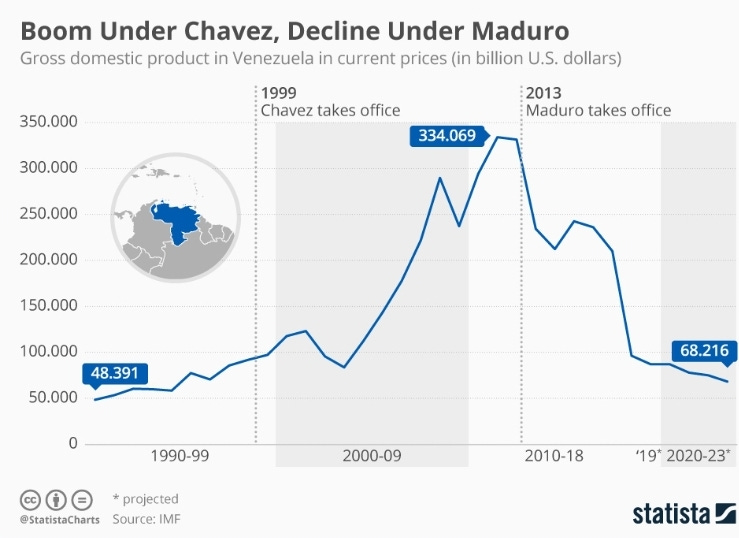The Futures - No. 67
Space economy jobs / Venezuela imploding / Gen Z blue-collar workers
In this issue
The Quantumrun team shares actionable trend insights about the Space Economy boom creating new jobs, Venezuela’s impending collapse, Gen Z pivoting to blue-collar work, and the successful mechanical heart implant.
Future signals to watch
Gen Z is pivoting to trade schools. Enrollment in vocational training programs is surging, with a 16 percent rise in vocational-focused community colleges in 2023, reaching the highest level since 2018.
Scottish homeowners could soon face fines for incorrect bin usage under a new Circular Economy bill that also bans the disposal of unsold goods.
Compassion in Politics' campaign to criminalize political lying gained traction as the Welsh government, ahead of the UK general election, committed to passing legislation disqualifying Senedd members and candidates found guilty of deliberate deception.
Australian scientists are genetically engineering black soldier flies to enhance their ability to consume organic waste and produce valuable ingredients for lubricants, biofuels, and animal feeds.
A small, plug-and-play solar panel allows individuals to generate their own electricity, empowering a green revolution in homes across Germany without significant investment or technical assistance.
An international team of neurobiologists is exploring the potential of genetically modifying Toxoplasma gondii to deliver medications across the blood-brain barrier, leveraging the parasite's ability to pass through this critical threshold.
Hollywood's video game performers announced a strike due to failed contract talks over AI protections, marking the second such strike under the Screen Actors Guild-American Federation of Television and Radio Artists.
A fully mechanical heart, using high-speed rail technology, was implanted in a human for the first time, marking a significant advancement in supporting patients awaiting heart transplants. The titanium-constructed blood pump with a magnetically levitated (Maglev) rotor was implanted as part of an FDA-overseen early feasibility study at the Texas Heart Institute.
Forward this email to a friend and help The Futures reach a wider audience :)
Culturally // Trending
YouTube → A Complete Unknown // X → This Pommel Horse Sensation // Reddit → This casual world record breaker // TikTok → Underconsumption Core // Instagram → The “hottest shoe” // Spotify → “Who”
🚀 The Space Economy can bring in more jobs
The Space Economy is skyrocketing to a $1.8-trillion industry by 2035, launching job opportunities across diverse sectors. This growth is largely driven by advances in space-based technologies, such as communications, Earth observation, and navigation services, which are becoming increasingly integral to industries like supply chain and transportation.
Space economy size ($ billion)

According to the World Economic Forum, the Space Economy's rapid expansion, with a growth rate of 9% per annum, surpasses the global GDP growth rate. These developments not only generate jobs within traditional aerospace roles but also extend to non-engineering fields, encouraging new career paths.
One of the key trends fueling job creation is the decreasing cost of launching satellites, which has dropped tenfold over the past two decades. This reduction has enabled a surge in satellite launches, which grew at a cumulative annual rate of above 50% from 2019 to 2023. As a result, new roles in satellite manufacturing, data analysis, and ground station operations are emerging.

Companies like SpaceX are leading this charge, with plans to add 30,000 more Starlink satellites, expanding their low-Earth orbit broadband constellation. This expansion is poised to meet the growing demand for reliable internet, particularly in underserved regions, potentially creating jobs in remote areas.
The competitive landscape between the US and China is also accelerating job creation in the space sector. The rivalry has prompted significant investments in space exploration and infrastructure development. For instance, China's ambitious lunar missions and the establishment of the Tiangong space station required various specialists, from mission planners to space habitat designers.
At the same time, the US Artemis program aims to establish a sustainable human presence on the moon, creating opportunities for roles in space logistics, construction, and resource management. This geopolitical competition ensures a continuous flow of funding and innovation, driving job growth and technological advancements into the decades ahead.
Actionable trend insights as the Space Economy creates more jobs:
For entrepreneurs
Entrepreneurs can create companies that design and deploy innovative systems to manufacture critical rocket and space/lunar station parts and equipment.
They can also license satellite data to develop analytics services of various kinds to track Earth-based systems, e.g., supply chains, pollution, weather, etc.
For corporate innovators
Manufacturing companies can invest in space-based manufacturing facilities that produce high-precision products, such as fiber optics, pharmaceuticals, and advanced materials that benefit from microgravity conditions.
For example, a corporation could partner with space station operators to establish production lines in orbit, producing goods that are difficult or impossible to manufacture on Earth.
Agri-corporations can explore space agriculture by developing systems and technologies for growing food in space.
For example, they could create compact, modular farming units that use hydroponics and advanced LED lighting to cultivate crops in space stations or lunar bases. These units could be designed to operate autonomously, using AI to monitor and adjust growing conditions.
For public sector innovators
Governments can stimulate local economies by funding the development of spaceports and launch facilities. These infrastructure projects would create jobs in construction, operations, and maintenance, and attract aerospace companies to the region.
They can offer grants that support comprehensive space education programs to prepare the future workforce for careers in the space economy. These programs could include partnerships with universities, research institutions, and space agencies to offer specialized degrees and training in space sciences, engineering, and space law.
Trending research reports from the World Wide Web
The Verge releases a cheat sheet on important AI terminologies and concepts.
According to Stack Overflow’s Annual Developer Survey, some developer positions (like blockchain), who earned over six figures in 2023, now report a median annual salary of $86,000 due to market corrections and the unpredictable nature of emerging technologies.
Unconditional cash led to substantial increases in employment rates and work hours for both recipients and control participants, with larger gains observed for the control group.
This interactive map shows you how your city’s temperature will change in the future.
For the IKEA Play Report 2024, 51% of parents reported spending more time playing with their children compared to a few years ago, despite other commitments like homework, after-school activities, and TV.
🇻🇪 Is Venezuela on the brink of collapse?
The recent elections in Venezuela have intensified the nation's political and economic crises. The presidential election resulted in widespread protests after the electoral authority, heavily influenced by President Nicolás Maduro's allies, declared him the winner with 51.2% of the vote.
Opposition candidate Edmundo Gonzalez, who stepped in after popular leader Maria Corina Machado was barred from running, claimed to have secured over 73% of the tally sheets. This disputed outcome has led to at least 11 deaths and nearly 750 arrests, with the opposition and many international leaders refusing to recognize Maduro's victory.
The economic backdrop of this election is dire. Venezuela, once an oil-rich nation, has seen its economy collapse due to plummeting oil prices and chronic mismanagement. Venezuela has experienced severe shortages of basic goods and soaring inflation, leading millions to flee the country.
Despite some economic growth in 2021, the majority of the population continues to suffer from extreme poverty. The government's control over key institutions, including the judiciary and the electoral council, has weakened the system of checks and balances, worsening the economic and political instability.

Looking ahead, Venezuela's situation appears bleak. With US sanctions tightening again and Chevron withdrawing its operations, the oil sector is expected to decline further, reducing production to less than 750,000 barrels per day. Skilled labor necessary to maintain oil production has largely fled the country, leaving little hope for recovery.
This ongoing economic decline, coupled with political repression and fraudulent elections, is likely to drive further migration and deepen the humanitarian crisis. Without significant policy changes and international intervention, Venezuela faces a future marked by continued instability and even societal collapse.
Actionable trend insights as Venezuela experiences economic and societal collapse:
For public sector innovators
Governments can work with international organizations, such as the United Nations and the Organization of American States (OAS), to facilitate open dialogue between the Venezuelan government and opposition. This could help create a pathway for peaceful resolution and fair elections.
They can implement a phased approach to sanctions relief conditioned on specific, verifiable steps towards democratic reforms and economic transparency. This incentivizes the Venezuelan government to comply with international standards while gradually improving economic conditions.
They can develop comprehensive economic aid packages tied to milestones in governance and human rights improvements. These packages should focus on rebuilding critical infrastructure, revitalizing the oil industry, and promoting diversification of the economy.
Outside curiosities
Oakley releases its Moonveil shades straight out of Mad Max.
Reddit blocks AI search engines from scraping its content (unless they pay up).
The Gen Alpha meme “Skibidi Toilet” is now a movie and TV series.
Got affected by the CrowdStrike outage? Here’s a $10 UberEats gift card.
The TV show “Veep” (which ended in 2019) is going viral after President Joe Biden’s endorsement of VP Kamala Harris.
More from Quantumrun
Read more daily trend reporting on Quantumrun.com
Subscribe to the Quantumrun Trends Platform (free for premium newsletter subscribers).
Corporate readers can review our Trend Intelligence Platform
Email us at contact@quantumrun.com with questions or feedback.
Finally, share your thoughts in the Substack comments below. We love hearing from you!
Interested in collaborating with the Quantumrun Foresight team? Learn more about us here.
See you in The Futures,
Quantumrun







How do you think the Space Economy boom will shape future job markets, and what skills will be most in demand as this industry grows?